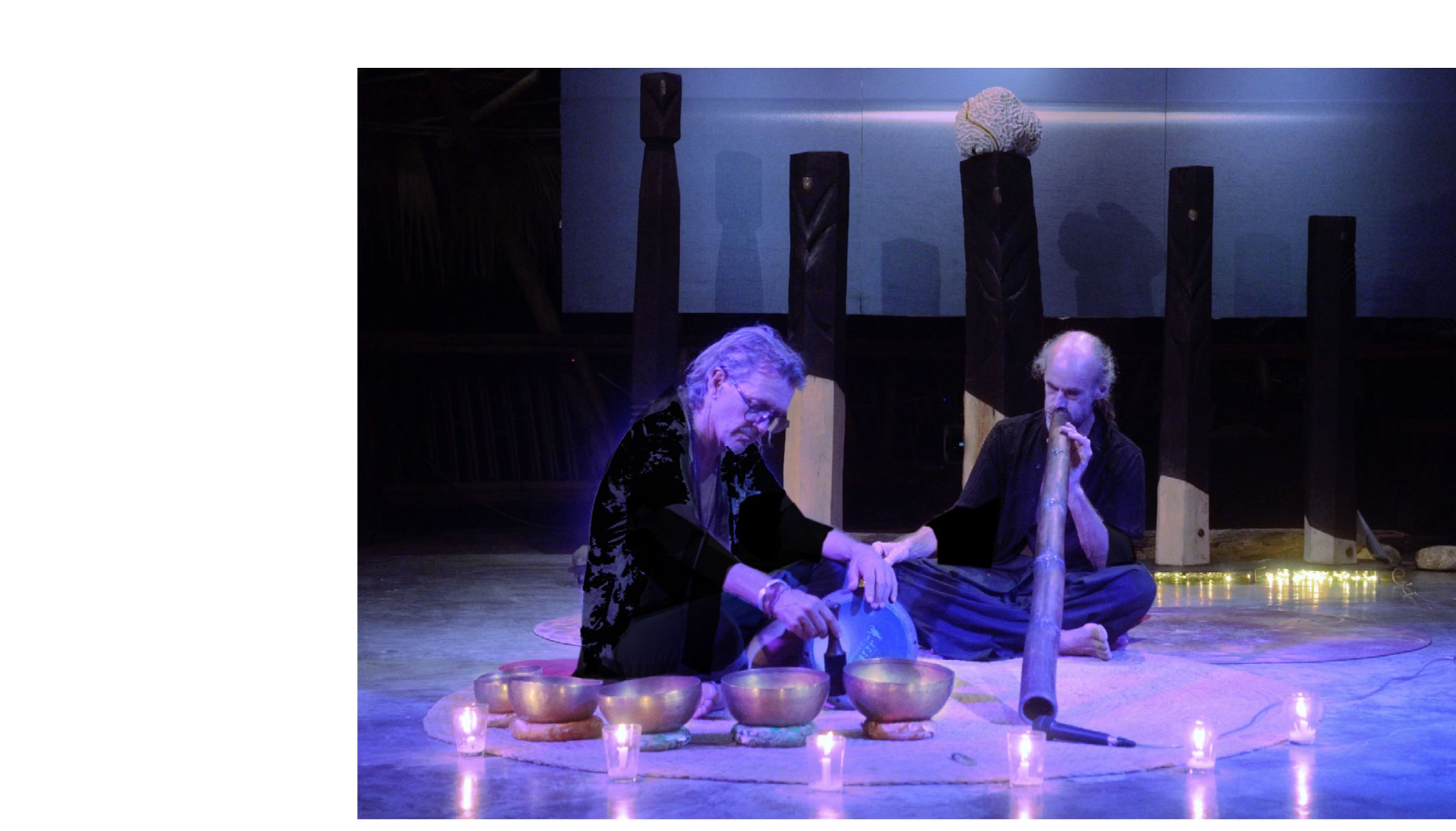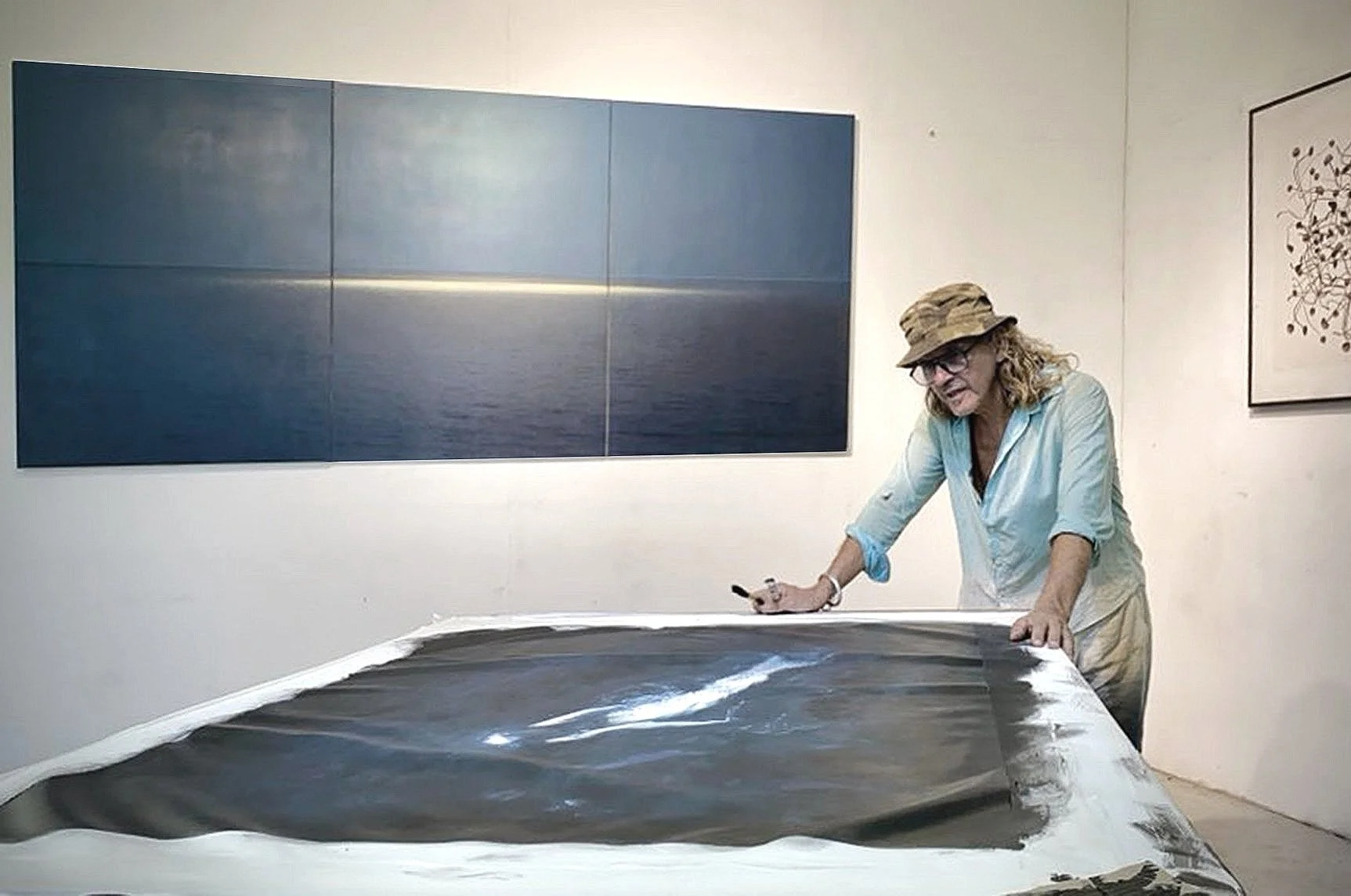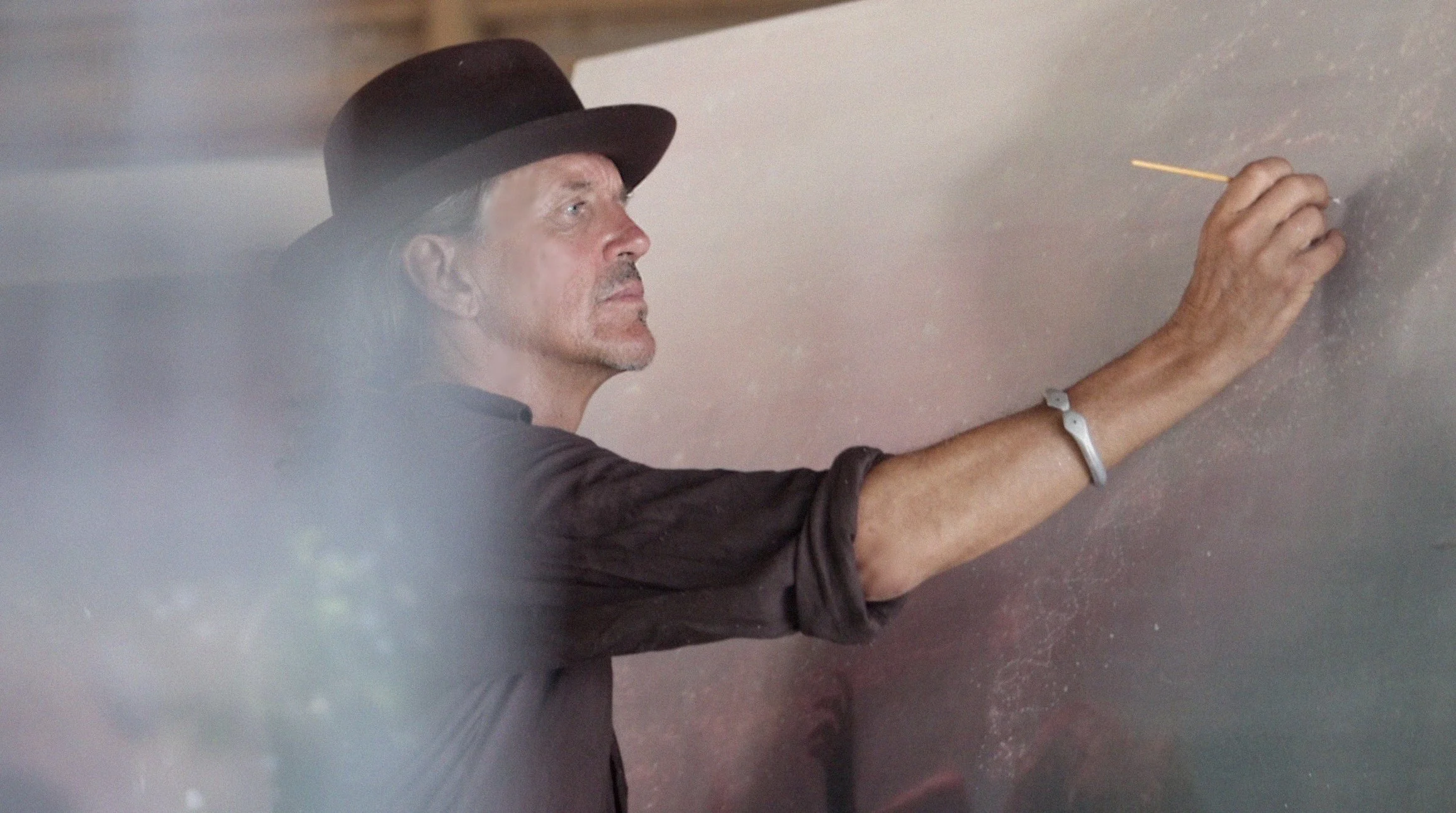Andrei Jewell
Born - Harare, Zimbabwe. Education - New Zealand, Japan, India. Celtic, Saxon & Polynesian heritage. Residency - Thailand
Selected Exhibitions
2000 PUBLIC SERVICE ANNOUNCEMENT, Te Papa National Museum, Wellington, NZ
2001 FANTASTIC EGG , LWML Foundation, Asia Pacific Triennale , Queensland Art Gallery, Australia
2003 FANTASTIC EGG, LWML Foundation, Australian Centre of Photography, Sydney
2003 ATMOSPHERES, Solo Show, MIC Gallery, Auckland, New Zealand
2004 THE HOLIWATER PROJECT, Auckland Museum, NZ
2006 CINEMATOGRAPHY, DoP for Runa Islam, Turner Prize Finalist, TATE, London
2007 THE HOLIWATER PROJECT, Jaipur Heritage Festival, India
2008 AFTER IMAGE, Group show, Two Rooms Gallery, Auckland, NZ
2009 HOLIWATER, Solo Show, Govett-Brewster Gallery, New Plymouth, NZ
2008 TRUE SOUTH, DoP for Isaac Julian, Two Rooms Gallery, Auckland, NZ
2007 - 2011, THE WORLD TOP 200 Photographers, Selected by Lurzer's Archive Publication, Austria
2011 AMANDEUS, Collective, SMAK Biennale, Ghent, Belgium
2012 AFTER THE TRANSIT OF VENUS, Solo Show, Jasmax, Auckland, NZ
2015 FUTURE PRIMITIVE, Dots&Clouds, 'W' Koh Samui, Thailand
2017 FANTASTIC EGG, LWML Foundation, Stress Field Biennale, Hubei Museum, Wuhan, China
2018 I AM OCEAN ( Film Installation) Eminent Domain Show, fmr. Robert Miller Gallery, New York
2019 THE RIVER WITHIN, Pyramid Centre, Koh Pha-nang, Thailand
2019 LESS PLASTIC MORE FANTASTIC ( Doc) Cannes Lion Festival, France
2020 BREATHER, ( Video ) Power-Play Art Biennale, Singapore
2023 THE CRYSTAL COVE, Solo-Exhibition, ‘The Longhouse’, Whynam Bay, Koh Pha-nang, Thailand
2024 THE CRYSTAL COVE, Atelier Gallery, Koh Samui / Shivari Centre, Koh Pha-nang, Thailand
Review
Holiwater: Installation and performance
19 September – 4 October 2009
Govett-Brewster Art Gallery
Andrei Jewell’s ‘Holiwater’, is a two-week installation embracing photography and film, classical Baul singing, electronic music, and breathtaking live performances, opens at the prestigious Govett-Brewster Art Gallery.
Born from the Ganges river of India, the Holiwater Project’s ambition is to inform and inspire positive action to stop the world’s water crisis turning to catastrophe.
The Govett-Brewster Art Gallery in New Plymouth is the sole host for the Holiwater performances in New Zealand on 2 and 3 October.
New Zealand filmmaker Andrei Jewell gathered together international musicians, The Holiwater Project to engage on both an arts and action level across world-wide audiences.
The installation of film, photography and music culminates at the Gallery, on Friday 2 and Saturday 3 October, with captivating public performances conceived to bring the experience of the river to the audience. Indian Baul singers will perform accompanied by live percussion and electronic music beds, within an environment of reflective video projection.
Holiwater curator and Govett-Brewster Art Gallery Director Rhana Devenport (https://www.instagram.com/rhanadevenport?igsh=aDg3dncwd2wwcWp6) says the Project evokes questions relevant to all of us. “With water quality an ever growing concern in New Zealand and Taranaki, Holiwater’s focus on this global issue through traditional mystic singing, contemporary sound and visual environments is indeed important and timely in focusing our senses and awareness on this issue.”
Andrei Jewell says that as a photographer and video artist he was inspired by the music of the Indian landscape and while he set out recording many great classical musicians he found himself preoccupied documenting two wandering Baul musicians on a pilgrimage along the Ganges river banks.
Jewell explains: “The Bauls worship the river through their music, they are mystics who see the river as a living deity. I noticed their reaction to the vast changes that had occurred to the river itself over a significant period of their lives. The river revealed many things that shape our modern world…its rhythms, its beauty, its people, its meaning for humanity and, sadly, its rapid deterioration in the face of neglect and misunderstanding…”
Since the turn of the millennium, The Holiwater Project has gathered together international artists – filming their music and performance – to give voice to the Ganges, her plight, and to focus attention on the sustainable management of water globally. This is the ninth year the project has partnered with regional and international organisations working with water and local communities.
“The mission is global. Holiwater is a personal portrait of India’s most sacred river.
It is an attempt at revealing her mystery and the extent of her demise – given that her condition shows so vividly the vulnerability of the Earth’s limited fresh water supplies in an uncertain age marked by rapid climate change,” says Jewell.
www.govettbrewster.com
www.artartworks.com/exhibitions/holiwater-installation-and-performance-1684/
Installation View: Nagar Fort Step Well, Jaipur Heritage Festival, India 2007

Andrei Jewell accompanied by Brian Moore
Sound Performance with Totem Installation work
Tibetan Bowls, Shaman Drum, Didgereedoo
The Crystal Cove Exhibition
Shivari Centre, Koh Phangan, Thailand
About The Artist
Andrei Jewell is a visual artist based in Thailand’s Gulf of Siam. He works with photography, film, video installation and performance. Exhibited internationally, his solo and collaborative works have featured in art biennale festivals and major museums, from London’s TATE Modern, Sydney’s Australian Centre for Photography to the Hubei Museum of Art, China. His work weaves narratives around human relationships to the environment, visual language and the audible and inaudible spectrum of soundscapes that often imperceptibly shape our identities with the world.
Discovering Zen philosophy early in life while on a scholarship in Kyoto, Japan his curiosity in Eastern Philosophy was piqued, leading to an extensive period in India, furthering studies in a traditional meditation ashram based on Kashmir Shaivism and Advaitan Vedantan traditions along with esoteric yoga practices. His travels and projects lead him to explore some of the most remote Buddhist valley kingdoms in the high Tibetan Himalaya. In his 40 year career as an art maker, a decade was spent largely studying, recording and performing with the music cultures of India’s Ganges River and in particular that of the West Bengali Baul. A syncretic mystic tradition of bard-musicians the Baul are known for their rustic poetry deeply inspired by Nature and influenced by both Sufi and Tantric traditions alike. Of particular influence are the many hundreds of kilometres of travel made up and down the Ganges, over an extensive period of more than a decade, recording two elderly wandering Baul singers, one blind since birth.
Photographed, filmed and recorded in the recent ten year period, the subjects Andrei Jewell has worked with are found almost exclusively in his local environment. The process starts from a conceptual base, recording explorations of the area, specific sounds emerge that engage with the subject thus affecting the mood of the piece filmed or photographed. The visual aspect of the final work starts by making a pigment print on flax linen canvas. A material traditionally used for centuries by oil painters and intrinsic to the old masters’ works.
The final stage and most time intensive process employs a layered mixed-media approach with a finishing technique termed ’overpainting’. It is a hand rendered process which Jewell sometimes employs the additional use of fine metallic powders, evaporated sea salt or light sensitive UV inks, in order to highlight particular details or narrative iterations in the finished work. This effect the artist terms as ‘‘a negotiation between the painterly and the photographic’’ and for him is a return to analogue rather than digital finishing processes. The art work actually being physically retouched by hand rather than any Ai driven computer program.
The rustic is of importance to Jewell, he draws much of his inspiration from the Baul and Zen traditions, particularly their music, painting and other art forms, in the production of his artworks, influencing a more minimalist, simple approach and methodology to his work. Born in Zimbabwe and later growing up in rural New Zealand, he was exposed to both local tribal African and Maori cultures, their dances, songs and adornments. These early influences also inform the performance and the totemic motifs found often woven throughout his work as a nuanced shading.
Working from his island based studio for over a decade, Andrei Jewell’s installations and exhibitions have consistently focused on Nature as a metaphor. His primary muse being the vast ever changing ocean, her moods and medicine, he continues to explore the fragile impermanence of our human existence through his art practice.
Deep Listening
Andrei Jewell has a very close connection to nature, living for over a decade at the very edge of a national park, on a jungle clad island in the Gulf of Siam. His isolated cliff top studio and residence faces a commanding view of the sea, where all the seasons are on full view, all of the time. Monsoon being no exception, this close proximity to Nature is central to Jewell’s work, made more poignant in the current age of rapid climate change marked by violent storms and flash floods witnessed worldwide.
His photographic and film works are often set in a single place of solitude, a place he calls The Crystal Cove, a hidden inlet rich with surviving corals and surrounded by massive crystalline rocks. Found just below his studio it’s an enchanting spot to photograph in. Free of any trappings, his figurative work shows the body exposed to direct sun, moonlight, salt water, on rocks or in the nearby jungle. His seascapes likewise are vast and empty, simply expressing the prevalent conditions of light and weather, the influence of these still works often bleeding over into his video installation works. The central theme to these works is the thread of Nature’s sound emanations. The artist refers to these as ‘‘variant frequencies that one can palpably feel but is unable to hear with a photograph - a type of mute artifact of memory’’. It is from this point of reference and departure the artist has set about making these works.
As with much of Jewell’s work, the central focus relies on the site specific spatiality of sound and the environment it inhabits. With The Crystal Cove Cantos grounding the body and it’s pranic system of subtle energy currents is central to Jewell’s methodology, as is the philosophical premise which draws upon from eastern mystical spiritual practices. For him Water and in particular it’s movement with waves, flows and rains induces a subtle healing charge in the body and thus one’s consciousness. The art works in a sense are both informed and inspired by the simple act of a return to a state of natural balance by being in and around bodies of water, unimpeded by the white noise of modernity which often disrupts the deeper brain states commonly termed as ‘flow’, a state most often attained through active or sitting meditation.
Jewell’s visual work draws upon a state of immersion with the body in raw nature, often depicted in suspension, floating, with the breath as a palpable subtext. Monsoon with it’s rains, weather, moods and vast array of sounds a particularly potent time, which the artist has taken his cue here with several pieces in the selected works.
Andrei Jewell notably draws upon the traditions of both Zen ink painting and 17th century European Romantacism, where the human figure is depicted in amongst the vast outdoors, immersed in a sense of inner silence amidst the deep sounds of Nature. The artist thus records his subjects in ‘an act of return and repair’ with Nature.
With Deep Listening he often activates his exhibitions with a ritual sound performance. The audience present also becomes participant in the works, their presence invited by the artist to contemplate, to dive into a more expansive space of stillness with what he terms, ‘‘Nurture remembering Nature.’’
For a behind the scenes look at Andrei Jewell’s film making practice with community art making engaged with ocean plastic pollution, please view the Cannes featured ( Lion Festival ) mini documentary below.
LESS PLASTIC MORE FANTASTIC
A behind the scenes documentary short film focusing on film & art making with a local beach community and it’s creative approach to addressing the ocean plastic pollution in the Gulf of Thailand.
Showcase screening at
CANNES, France 2019 ( Lion Festival )
Trilogy
Overview of a conceptual work based on a 17th Century Japanese ink painting by Zen master Senghai
The Crystal Cove - The Longhouse Ceremony
Opening of The Longhouse exhibition at Whynam Bay, 2023, Koh Phangang, Thailand
The Crystal Cove - Atelier vernisage
Atelier Gallery, Koh Samui, Thailand 2024



